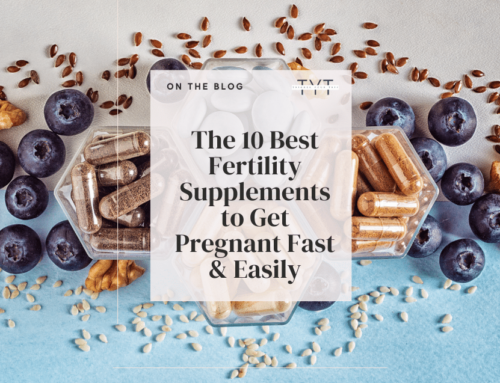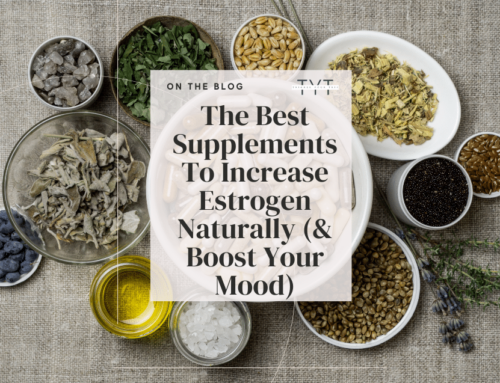The health and wellness sphere is constantly in flux, with discoveries and focuses emerging regularly when it comes to supplements – and yes, there are supplements to reduce cortisol. Cortisol is often dubbed the body’s primary stress hormone, produced by our adrenal glands. It is indeed instrumental in many bodily functions, including the regulation of blood pressure and stress management.
However, the adverse effects start brewing when cortisol hormone levels persistently remain high due to chronic stress levels, leading to too much cortisol secretion. This can result in a plethora of health complications, including the unwanted gain of belly fat.
Recent research underscores the importance of regulating cortisol levels for weight management and overall health and its adverse effects. Lowering cortisol levels can be a huge factor in reducing stress significantly. For instance, a study by Marshall University identified lowering cortisol levels as an indicator of success in addiction recovery.
We’ll explore how the best supplements can reduce cortisol levels, their advantages, and any possible downsides. Some herbal supplements to reduce cortisol include the well-known omega-3 fatty acids, famous for helping lower stress, and Ashwagandha, a natural adaptogen that aids your body in reducing stress levels. Every supplement provides a distinctive approach to lower cortisol levels, offering various health benefits.
Understanding and managing the stress hormone cortisol becomes crucial for being and staying healthy. So, let’s embark on this journey together, exploring how we can regulate cortisol levels and reduce stress for a healthier, happier life.
Read More: The 12 Best Supplements To Increase Estrogen Naturally
How Do I Lower My Cortisol Levels to Lose Weight?
Lowering elevated cortisol levels can have significant health benefits. For instance, a study published in “Psychoneuroendocrinology” found that individuals who engaged in mindfulness practices, such as meditation and yoga, had significantly lower cortisol levels.
Moreover, a research review in “Current Opinion in Endocrinology, Diabetes and Obesity” highlighted that omega-3 fatty acids, found in fish, walnuts, and flaxseeds, can help reduce cortisol levels. Lower cortisol levels aid in weight loss, reduce inflammation, improve sleep quality, and enhance overall well-being.
There are a few ways to lower cortisol levels:
Deep Breathing and Relaxation Techniques
Deep breathing and relaxation exercises significantly reduce stress and promote tranquility in various scenarios, especially when you wish to treat anxiety. These techniques improve sleep quality and trigger the body’s natural relaxation response, which reduces your heart rate and blood pressure.
Here’s a simple guide:
- Find a comfortable spot: Whether seated or lying down, ensure you’re completely relaxed.
- Pay attention to your breathing: Inhale slowly through your nose, counting up to four. Hold this breath for a seven-count, then gradually exhale through your mouth for eight counts.
- Do it again: Repeat this cycle four times.
This practice can be utilized before confronting a stressful circumstance, sleeping time, or treating anxiety.
To incorporate it into your daily regimen, reserve a few minutes every morning and night for these deep breathing routines.
You can experience diminished chronic stress levels, heightened concentration, improved sleep patterns, and a generally elevated sense of well-being through steady application. Integrating these methods into your everyday life can help you lower stress.
Regular Exercise
Embracing a lifestyle filled with physical activity is critical in controlling elevated cortisol levels. Consistently engaging in exercise, especially high-intensity interval training (HIIT), helps you fight weight gain and has been shown to balance these levels effectively.
HIIT includes cycles of vigorous exercise followed by periods of rest or less intense activities. This form of exercise not only aids in cortisol reduction but also helps reduce anxiety, boosts metabolism, and aids in weight loss.
Strive to perform at least 30 minutes of moderate-intensity exercise on most days. Consider including outdoor pursuits like walking or cycling, which bring additional benefits of sunlight and fresh air. Alternatively, enroll in a group fitness class or take up a sport you enjoy. The key is finding physical activities you genuinely enjoy and incorporating them into your routine.
Get Adequate Sleep
Sleep is crucial in preserving hormonal balance, including cortisol and overall health. Insufficient sleep can upset this balance, leading to weight gain and increased cortisol levels. It’s essential to ensure you achieve 7-9 hours of restorative sleep each night.
Develop a consistent sleep routine and design a serene environment that promotes sleep. Consider incorporating activities like meditation or yoga before bed to improve sleep quality.
Limiting screen time before sleep might also be beneficial, as the light of electronic devices can disrupt your body’s natural circadian rhythm.
Stress Management
Persistent chronic stress can result in heightened cortisol levels. Incorporating various techniques into your daily regimen can help reduce stress while keeping healthy cortisol levels balanced.
This could involve mindfulness exercises, deep breathing practices, yoga, or spending time on hobbies you enjoy. However, embarking on therapy to learn practical stress techniques is one of the most constructive ways to manage your anxiety.
Regularly setting aside time to relax and decompress can significantly lower cortisol levels and aid in weight reduction. Exploring other relaxation methods like aromatherapy or soothing music can further bolster your chronic stress management efforts.
Healthy Diet
The dietary decisions you make can significantly impact your cortisol levels. A well-rounded diet encompassing whole foods, lean proteins, fruits, vegetables, and beneficial fats is recommended.
Edibles like dark chocolate, bananas, and pears can help reduce cortisol levels. Moreover, ensuring adequate hydration and limiting caffeine intake can aid in controlling cortisol.
It would be beneficial to include foods abundant in omega-3 fatty acids, like fish and flaxseeds, known for their properties that alleviate stress.
Also, consider reducing your alcohol consumption, as it can disrupt your body’s hormonal balance and lead to elevated cortisol levels.
Read More: The 9 Top Vitamins For Skin Health to Rejuvenate And Shine
I constantly try to have a balanced diet, but having the necessary vitamin intake from my food alone is impossible. That’s why I’m a fan of the NutriGenesis Multivitamins, which can supply 100%+ Daily Value of 17+ vitamins and minerals in formulas customized for women, and it can be the starting point of fueling your body with relevant vitamins.
The NutriGenesis Multivitamin contains all the necessary nutrients a woman’s body needs. Even if you have a balanced diet, fueling your body with all these vitamins daily is impossible.
What Supplements Lower Cortisol Most?
On one’s path to improved wellness, acknowledging mental health problems that may affect heightened cortisol levels is key. Increased cortisol is a typical normal response to stress and could pose a health hazard. Whether the stress is constant, sleeping patterns are poor, or anxiety disorders, assimilating techniques to diminish cortisol levels is critical.
Decreasing cortisol levels in the body is essential for maintaining brain health and overall well-being, and supplements can be a helpful tool in achieving this. Fish oil supplements containing healthy fats are one example of a supplement that can potentially impact cortisol levels. If you’re looking to reduce cortisol levels, consider incorporating these supplements into your routine:
Supplements can help maintain brain health and overall well-being by lowering cortisol levels. For instance, healthy fats like those found in fish oil supplements can also have an impact. Here are a few supplements that can help you lower your cortisol levels:
Ashwagandha
The adaptogenic properties of Ashwagandha go beyond just managing cortisol levels; they further aid in mitigating stress. This plant can regulate the secretion of cortisol by the adrenal glands, preventing excessive production that can lead to fatigue, weight gain, and emotional instability.
When faced with ongoing stress, your adrenal glands might produce too much cortisol, but Ashwagandha helps moderate this response. Numerous scientific studies, including one conducted by the National Institutes of Health, have shown that Ashwagandha can decrease cortisol levels by up to 30% in individuals experiencing chronic stress.
It has also been reported to improve sleep quality and reduce symptoms of anxiety. These findings confirm Ashwagandha’s potential effectiveness in addressing disorders caused by stress and promoting overall adrenal health.
Rhodiola Rosea
Rhodiola Rosea is a robust adaptogen recognized for its capacity to reduce cortisol and bolster stress resistance. It affects the adrenal glands and moderates their cortisol production during stressful circumstances. This adjustment aids individuals in better managing their stress.
Studies have shown that this adaptogen can substantially lower cortisol, alleviate burnout symptoms, and enhance overall well-being. It has also been linked to improved cognitive performance, such as increased focus and concentration.
By aiding in the balance of cortisol levels, Rhodiola Rosea plays a key role in sustaining healthy adrenal function, contributing to improved resilience to stress and mental lucidity.
Magnesium
Magnesium’s function in controlling cortisol levels is essential. A deficiency in this critical mineral can result in elevated cortisol, leading to stress, anxiety, and other health complications.
Supplementation with magnesium can not only aid in handling stress reactions but also decrease cortisol levels. It is highly capable of regulating the discharge of cortisol from the adrenal glands and fostering overall well-being.
A magnesium-rich diet, including leafy greens, whole grains, and nuts, can also help reduce cortisol levels. Magnesium is an excellent option if you’re looking for supplements to lower cortisol levels.
Regular consumption of magnesium can assist in preserving balanced levels of cortisol, leading to a more serene mindset devoid of stress hormones.
Phosphatidylserine
Phosphatidylserine, an extraordinary compound derived from amino acids soluble in fats, is widely recognized for reducing cortisol levels following intense exercise or high-stress situations.
It interacts with the adrenal glands, restraining excessive cortisol production and reducing cortisol within the body. Consistent usage of phosphatidylserine supplements can assist the adrenal glands in maintaining cortisol equilibrium, resulting in improved stress resilience and enhanced cognitive function.
It can also help regulate mood and sleep patterns, contributing to a more relaxed and healthy lifestyle.
L-Theanine
L-theanine, a primary amino acid naturally occurring in tea leaves, induces relaxation without inducing fatigue. This amino acid is scientifically proven to effectively lower cortisol levels by regulating overactivity in the adrenal gland, inhibiting excessive cortisol. Regular intake of L-theanine can aid in keeping cortisol levels low, fostering overall mental health. It provides a beneficial natural method for those aiming to reduce stress hormone levels, heighten focus, and boost cognitive functioning. Moreover, pairing L-theanine with caffeine may offer a steady energy increase without the nervousness commonly linked to high caffeine consumption.
Fish Oil (Omega-3 Fatty Acids)
The key elements of fish oil, Omega-3 fatty acids, are highly praised for their capacity to lessen cortisol levels when faced with stress. They regulate the body’s stress response, effectively lowering cortisol hormone levels. Omega-3 fatty acids possess anti-inflammatory properties that may further inhibit cortisol production. Consistent consumption of Omega-3s can assist in maintaining cortisol balance, contributing to comprehensive stress hormone management.
These fatty acids help control cortisol and foster heart health and cognitive function.
BONUS TIP:
Unless your body has a specific supplement deficit (like Iron or vitamin D deficit), I suggest taking a multivitamin instead. My favorites are the NutriGenesis Multivitamins,which can supply 100%+ Daily Value of 17+ vitamins and minerals in formulas customized for women, and it can be the starting point of fueling your body with all the relevant nutrients.
Read More: The Best Face Mask for Men for a Perfect Self-Care Weekend
What Supplements Can Help Lose Belly Fat?
Belly fat, often a stubborn adversary, can be challenging to shed despite rigorous diet and exercise. It’s not just an aesthetic concern; excessive abdominal fat is linked to severe health issues like heart disease and diabetes.
While there is no magic pill for weight loss, certain supplements have proven effective in aiding belly fat reduction, mainly by regulating stress hormones like cortisol.
While lifestyle changes remain crucial, a few supplements to reduce cortisol, such as green tea extract, chromium picolinate, and conjugated linoleic acid (CLA), can provide a helpful boost in your battle against belly fat. This article delves into these potent aids, providing a comprehensive guide on the most effective supplements for targeting that troublesome midsection.
Green Tea Extract
Green tea extract stimulates metabolism and supports fat burning, especially in the belly area, due to its rich antioxidant content. The main component, EGCG, assists in the breakdown of fat and prevents new fat cells from forming.
The thermogenic characteristics of green tea extract enhance the body’s heat production, leading to increased calorie burning. Research indicates that this thermogenesis process can support weight loss by increasing energy output during rest periods.
Caffeine
More than just a pick-me-up, caffeine has been shown to aid fat reduction by accelerating metabolism. Research shows it helps mobilize fats from adipose tissue, making them readily available as an energy source. Consequently, caffeine consumption can lead to an increased fat-burning rate, including in the belly area.
However, it’s important to remember that excessive caffeine intake can increase cortisol levels. Moderation is key when incorporating caffeine into your diet for weight loss purposes.
Caffeine may also amplify the fat-burning effects of your exercise routine. Interestingly, caffeine could potentially curb appetite, assisting in lowering calorie consumption and supporting weight loss.
Conjugated Linoleic Acid (CLA)
CLA, a fatty acid naturally present in meat and dairy products, has been researched for its ability to degrade body fat and slow fat production.
Certain studies indicate that CLA might specifically target belly fat. It could enhance lean muscle mass, supporting weight loss and improving body composition. Furthermore, CLA might help control blood sugar and insulin levels, possibly decreasing the chances of metabolic syndrome and diabetes.
Garcinia Cambogia
Extracted from a tropical fruit, Garcinia Cambogia contains hydroxy citric acid (HCA), thought to inhibit an enzyme involved in fat production, thereby assisting in weight loss.
It might also enhance serotonin levels, potentially aiding in managing hunger and cravings. While preliminary research suggests a minor impact on weight reduction, further investigations are required to substantiate this. Despite the varied results, numerous people persist in incorporating this supplement into their weight loss regimen.
Probiotics
These helpful bacteria are critical in weight control. Specific strains are known to limit dietary fat absorption, increase the amount of fat expelled in feces, and promote feelings of fullness.
They also promote a healthier gut microbiome, increasingly acknowledged for its role in weight control. A balanced gut microbiome can enhance digestion, mitigate inflammation, and boost nutrient absorption – all critical factors in weight loss.
Bear in mind these supplements can assist in reducing belly fat, but they yield the best results when paired with a nutritious diet and consistent exercise.
Always seek advice from a healthcare expert before beginning any new supplement routine. Also, it’s crucial to understand that supplements are not a quick fix for weight loss but a resource that can complement your ongoing efforts toward a healthier lifestyle.
Weight loss requires time and patience, and maintaining a healthy weight requires a lifelong commitment to healthy eating and physical activity habits.
Read More: What’s the Best Sleep Hat To Leave Hair Intact in the Morning?
Final Thoughts
Reducing cortisol levels, the stress hormone, boosting the immune system, limiting caffeine intake, prioritizing overall health, and targeting belly fat are three crucial components of promoting a healthy human body and mind. It is the body’s primary stress hormone. While supplements to reduce stress alone may not be the solution, incorporating them into your overall wellness routine can provide significant benefits.
Always consult a healthcare professional before starting any new supplement regimen, and prioritize a balanced diet, regular exercise, and a robust immune system for long-term success. With dedication and consistency, you can achieve your wellness goals, avoid adverse effects, and maintain a healthy lifestyle. Try these natural supplements to support your journey towards lower cortisol hormone levels, a more robust immune system, and a trimmer waistline.







